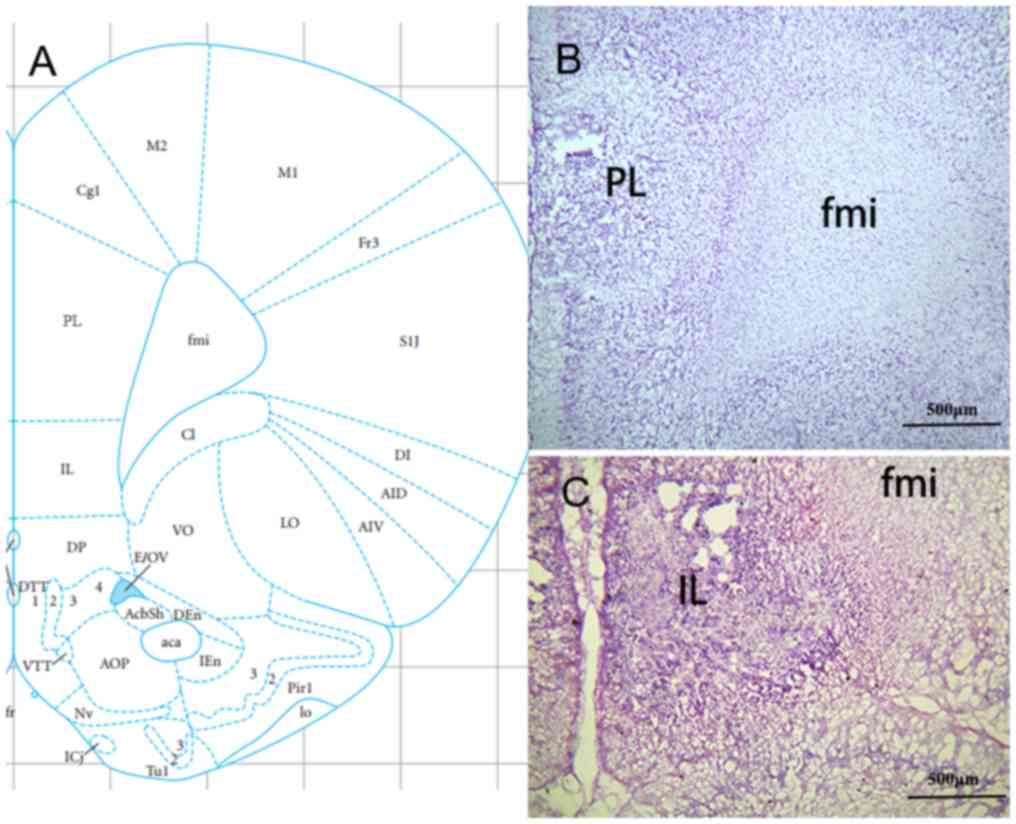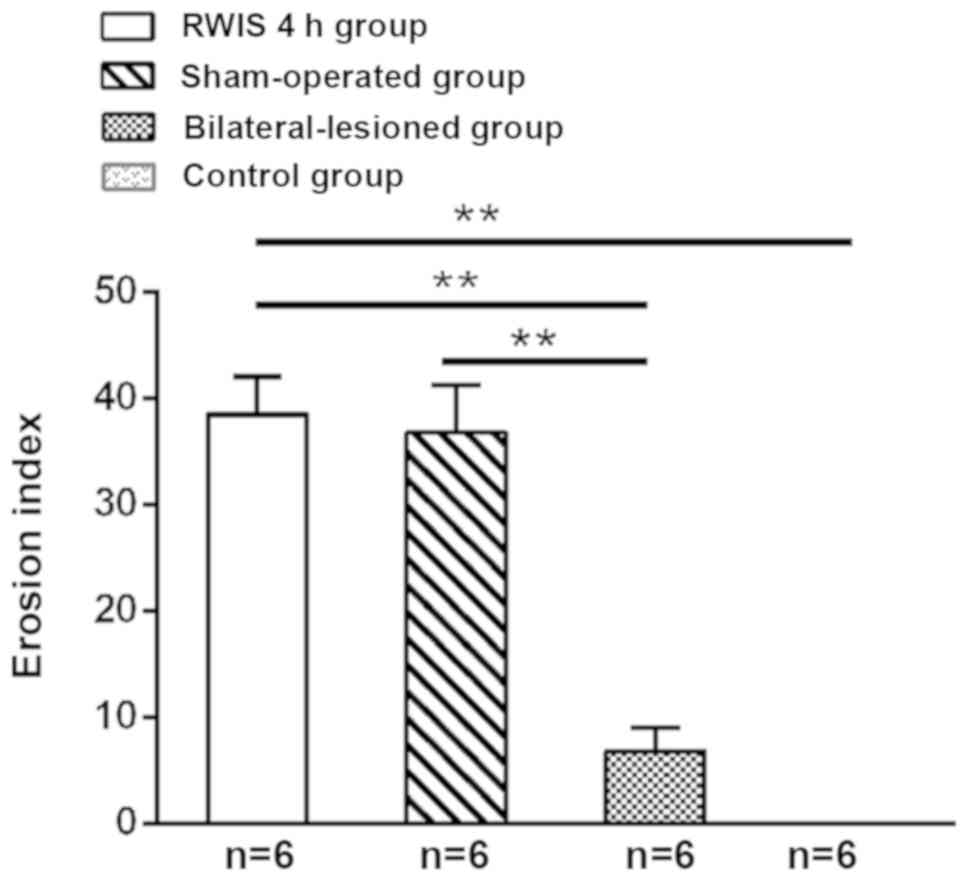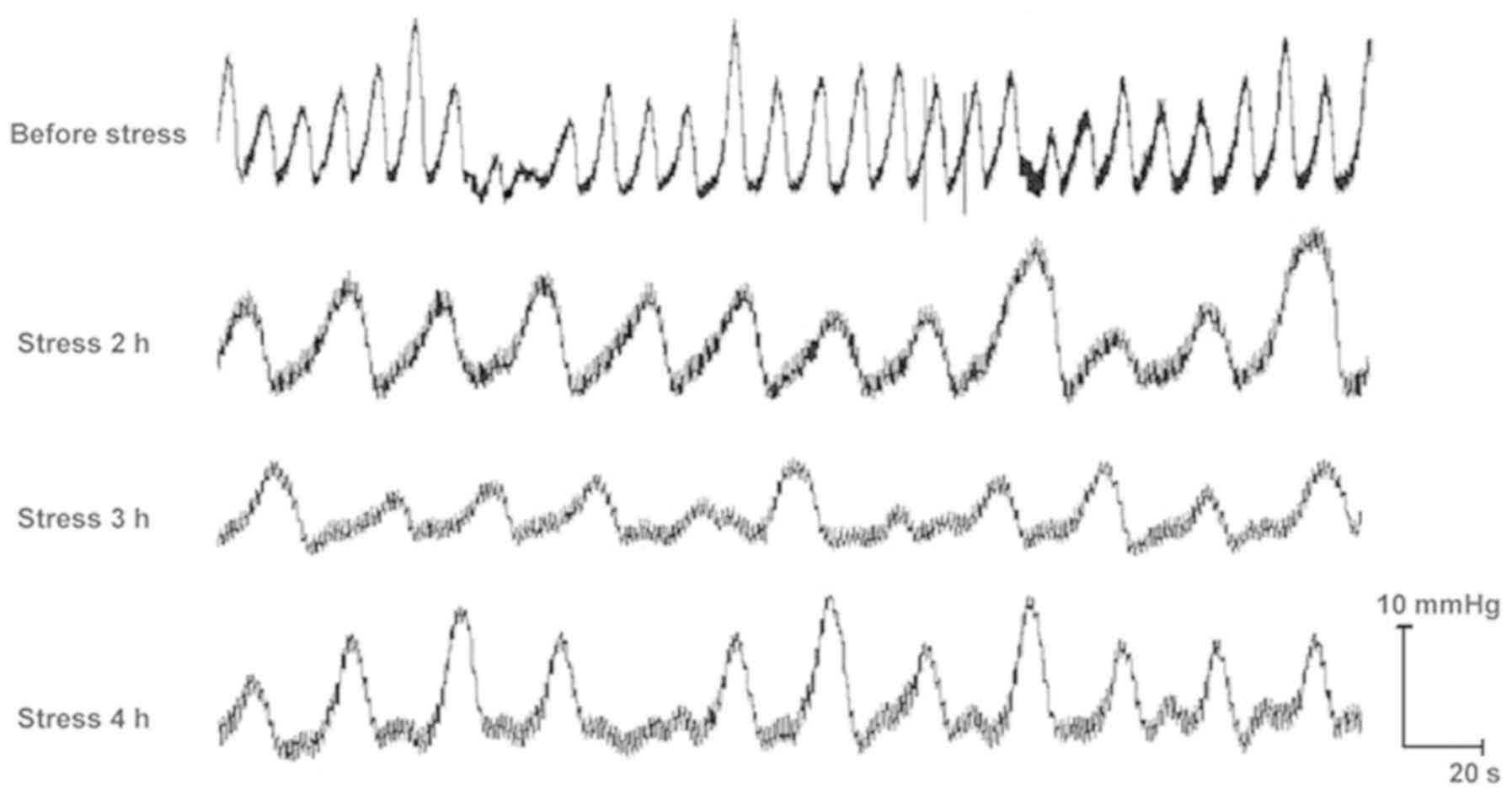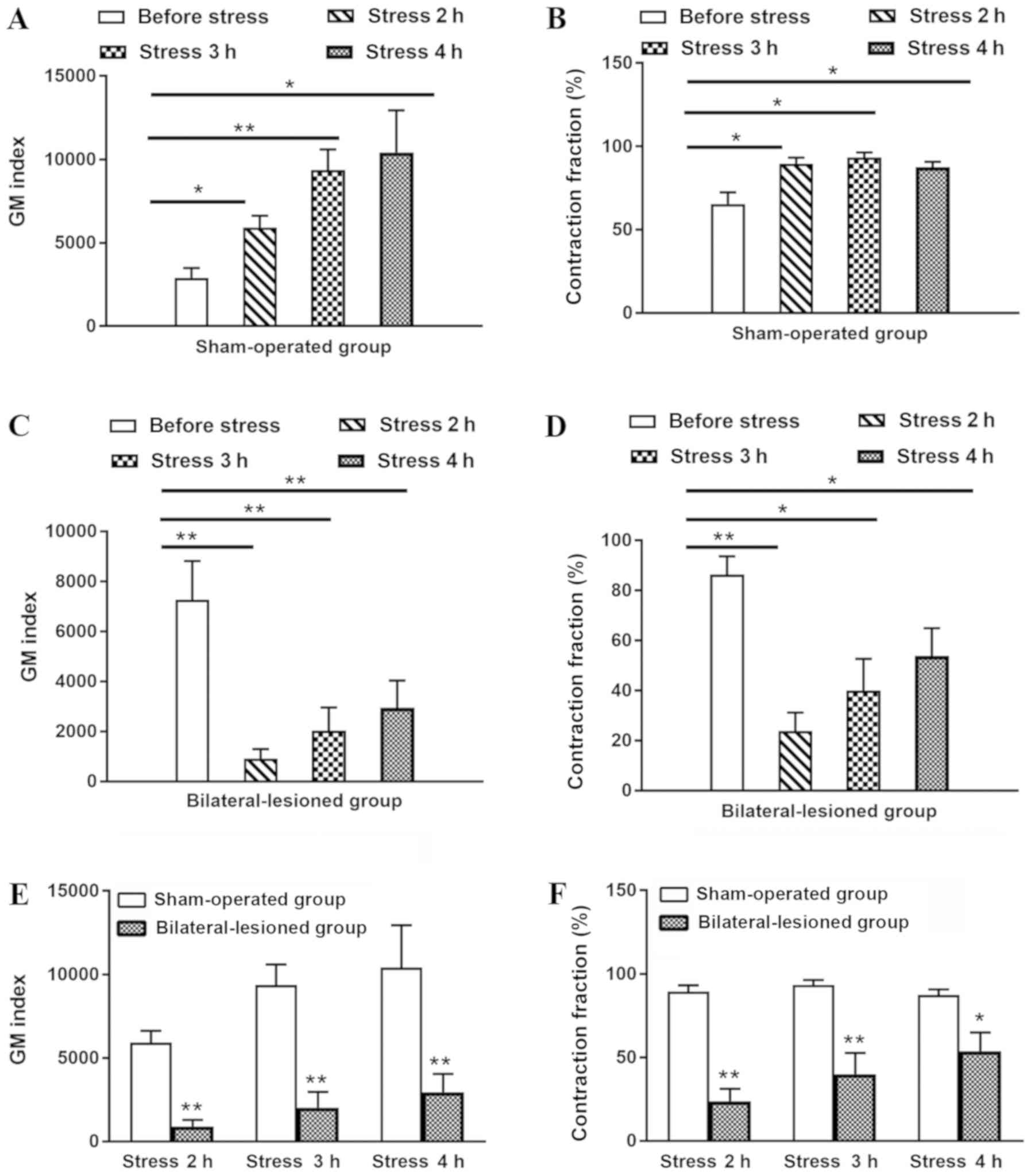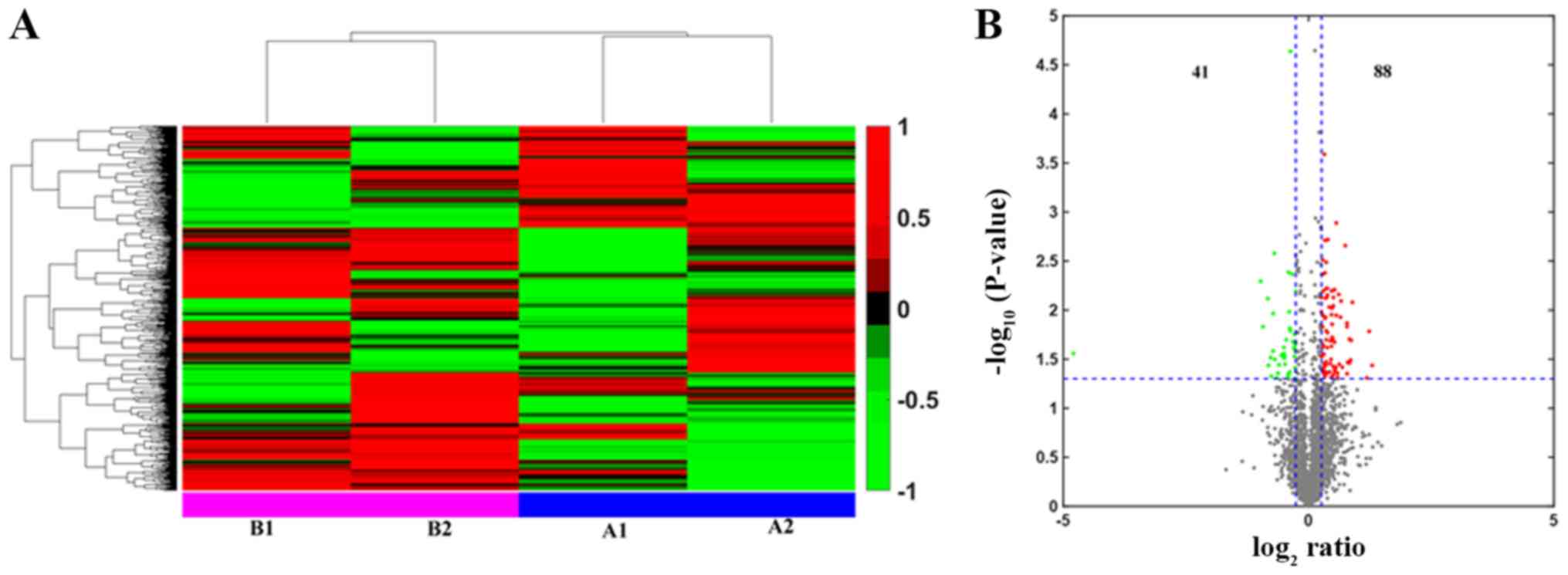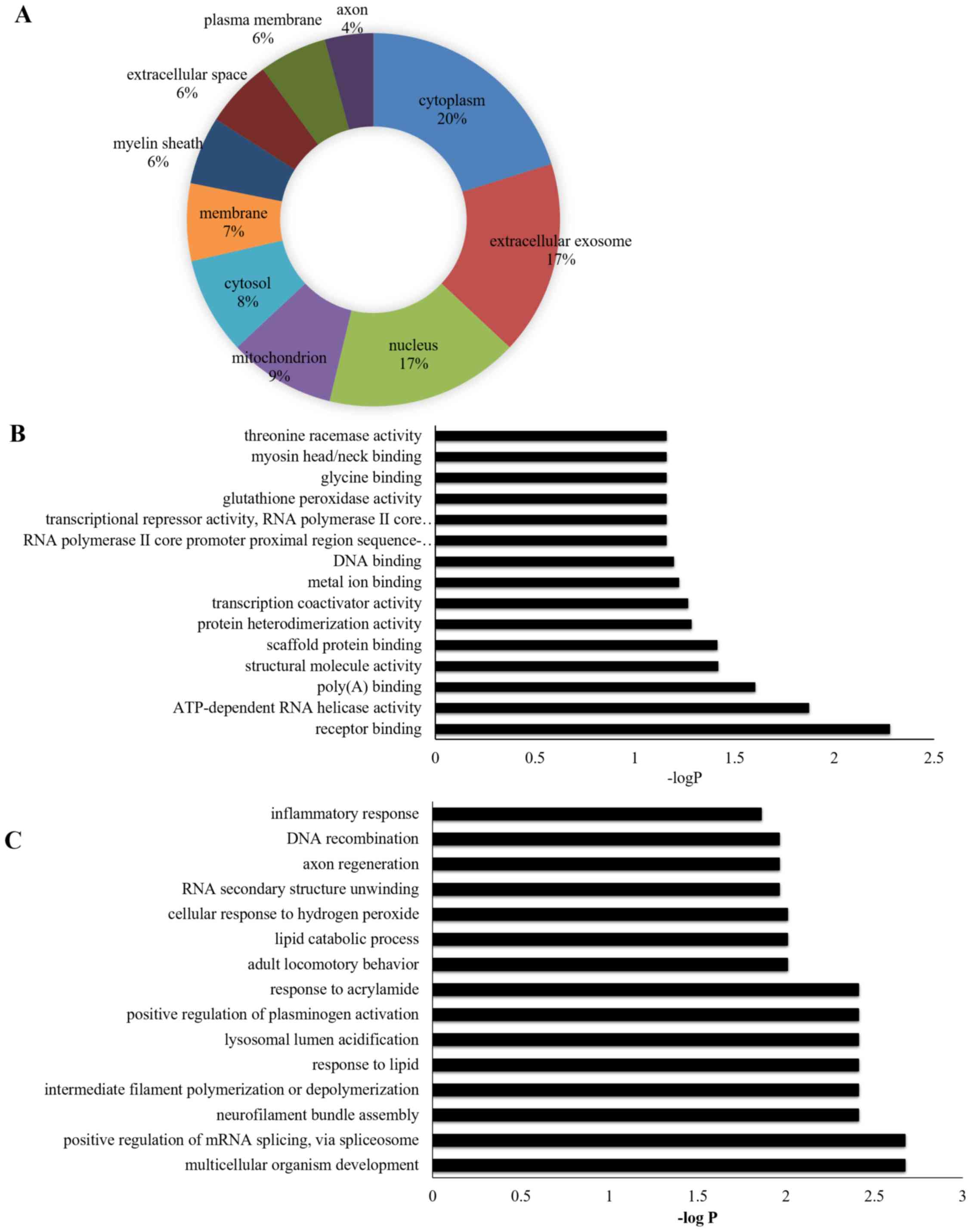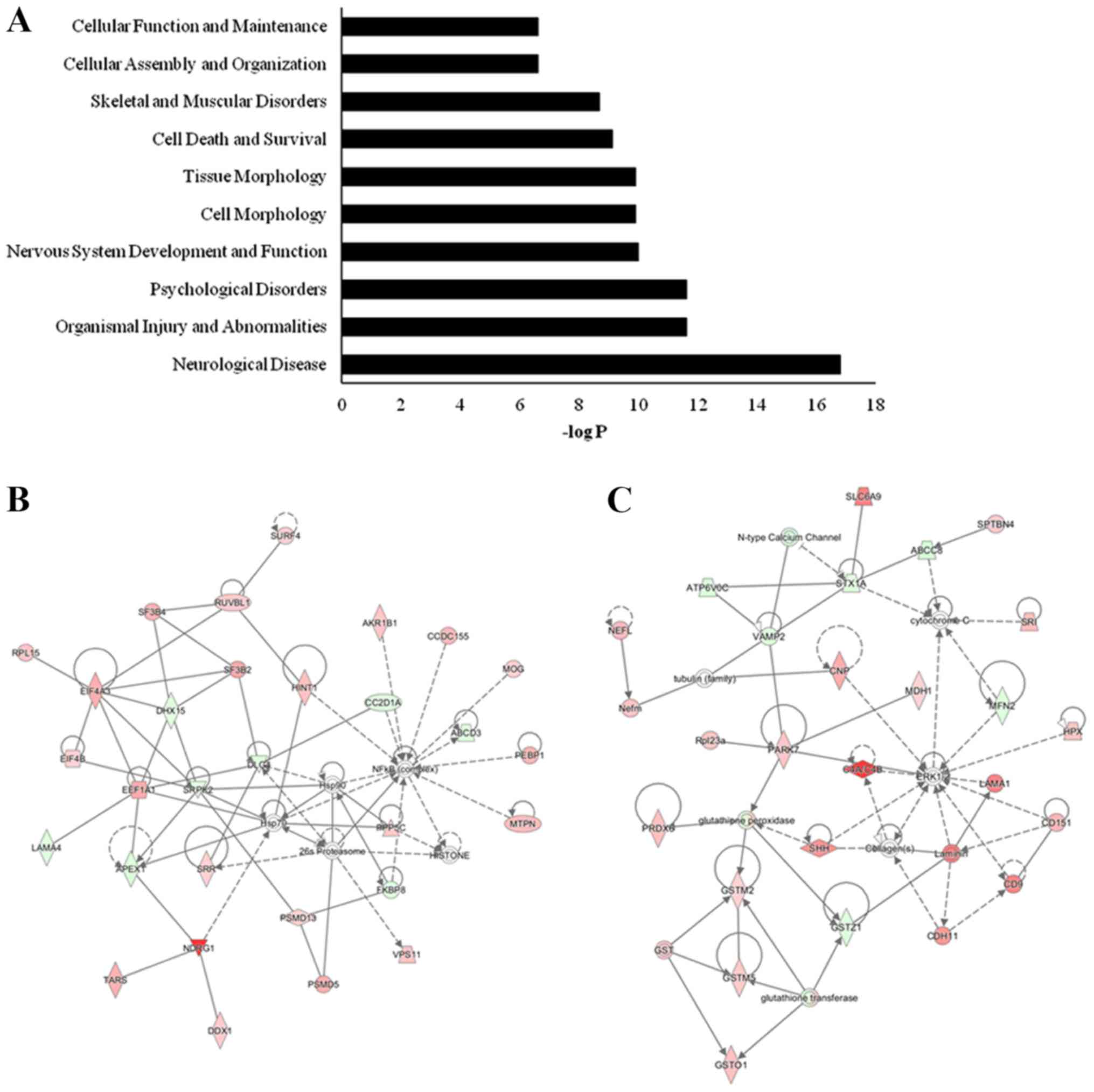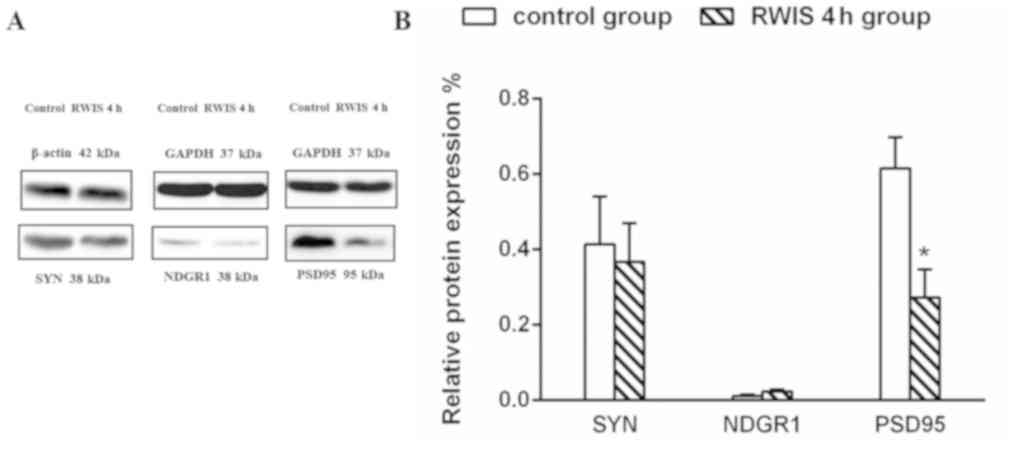|
1
|
Saxena B and Singh S: Comparison of three
acute stress models for simulating the pathophysiology of
stress-related mucosal disease. Drug Discov Ther. 11:98–103. 2017.
View Article : Google Scholar : PubMed/NCBI
|
|
2
|
Jaggi AS, Bhatia N, Kumar N, Singh N,
Anand P and Dhawan R: A review on animal models for screening
potential anti-stress agents. Neurol Sci. 32:993–1005. 2011.
View Article : Google Scholar : PubMed/NCBI
|
|
3
|
Huang P, Zhou Z, Wang H, Wei Q, Zhang L,
Zhou X, Hutz RJ and Shi F: Effect of the IGF-1/PTEN/Akt/FoxO
signaling pathway on the development and healing of water immersion
and restraint stress-induced gastric ulcers in rats. Int J Mol Med.
30:650–658. 2012. View Article : Google Scholar : PubMed/NCBI
|
|
4
|
Huang P, Zhou ZR, Zheng MQ and Shi FX:
Effect of the IGF-1/PTEN/Akt/FoxO signalling pathway in the
duodenal mucosa of rats subjected to water immersion and restraint
stress. Genet Mol Res. 11:4775–4788. 2012. View Article : Google Scholar : PubMed/NCBI
|
|
5
|
Ohta Y, Yashiro K, Ohashi K, Kusumoto C,
Matsura T, Hidaka M and Fukuzawa K: Vitamin E depletion enhances
liver oxidative damage in rats with water-immersion restraint
stress. J Nutr Sci Vitaminol (Tokyo). 59:79–86. 2013. View Article : Google Scholar : PubMed/NCBI
|
|
6
|
Zhou ZR, Huang P, Song GH, Zhang Z, An K,
Lu HW, Ju XL and Ding W: Comparative proteomic analysis of rats
subjected to water immersion and restraint stress as an insight
into gastric ulcers. Mol Med Rep. 16:5425–5433. 2017. View Article : Google Scholar : PubMed/NCBI
|
|
7
|
Fan F, Li L, Liu W, Yang M, Ma X and Sun
H: Astrocytes and neurons in locus coeruleus mediate restraint
water immersionstress-induced gastric mucosal damage through the
ERK1/2 signaling pathway. Neurosci Lett. 675:95–102. 2018.
View Article : Google Scholar : PubMed/NCBI
|
|
8
|
Xu Y, Jia J, Xie C, Wu Y and Tu W:
Transient receptor potential ankyrin 1 and substance P mediate the
development of gastric mucosal lesions in a water immersion
restraint stress rat model. Digestion. 97:228–239. 2018. View Article : Google Scholar : PubMed/NCBI
|
|
9
|
Zhang YY, Cao GH, Zhu WX, Cui XY and Ai
HB: Comparative study of c-Fos expression in the rat dorsal vagal
complex and nucleus ambiguus induced by different durations of
restraint water-immersion stress. Chin J Physiol. 52:143–150. 2009.
View Article : Google Scholar : PubMed/NCBI
|
|
10
|
Zhang YY, Zhu WX, Cao GH, Cui XY and Ai
HB: c-Fos expression in the supraoptic nucleus is the most intense
during different durations of restraint water-immersion stress in
the rat. J Physiol Sci. 59:367–375. 2009. View Article : Google Scholar : PubMed/NCBI
|
|
11
|
Zhao DQ, Lu CL and Ai HB: The role of
catecholaminergic neurons in the hypothalamus and medullary
visceral zone in response to restraint water-immersion stress in
rats. J Physiol Sci. 61:37–45. 2011. View Article : Google Scholar : PubMed/NCBI
|
|
12
|
Zhao DQ and Ai HB: Oxytocin and
vasopressin involved in restraint water-immersion stress mediated
by oxytocin receptor and vasopressin 1b receptor in rat brain. PLoS
One. 6:e233622011. View Article : Google Scholar : PubMed/NCBI
|
|
13
|
Sun H, Liu Z and Ma X: Interactions
between astrocytes and neurons in the brainstem involved in
restraintwater immersion stress-induced gastric mucosal damage.
Neuroreport. 27:151–159. 2016. View Article : Google Scholar : PubMed/NCBI
|
|
14
|
Sun H, Li R, Xu S, Liu Z and Ma X:
Hypothalamic astrocytes respond to gastric mucosal damage induced
by restraint water-immersion stress in rat. Front Behav Neurosci.
10:2102016. View Article : Google Scholar : PubMed/NCBI
|
|
15
|
Sun H, Zhao P, Liu W, Li L, Ai H and Ma X:
Ventromedial hypothalamic nucleus in regulation of stress-induced
gastric mucosal injury in rats. Sci Rep. 8:101702018. View Article : Google Scholar : PubMed/NCBI
|
|
16
|
Vertes RP: Interactions among the medial
prefrontal cortex, hippocampus and midline thalamus in emotional
and cognitive processing in the rat. Neuroscience. 142:1–20. 2006.
View Article : Google Scholar : PubMed/NCBI
|
|
17
|
Neafsey EJ: Prefrontal cortical control of
the autonomic nervous system: Anatomical and physiological
observations. Prog Brain Res. 85:147–166. 1990. View Article : Google Scholar : PubMed/NCBI
|
|
18
|
Hurley-Gius KM and Neafsey EJ: The medial
frontal cortex and gastric motility: Microstimulation results and
their possible significance for the overall pattern of organization
of rat frontal and parietal cortex. Brain Res. 365:241–248. 1986.
View Article : Google Scholar : PubMed/NCBI
|
|
19
|
Sullivan RM and Gratton A: Lateralized
effects of medial prefrontal cortex lesions on neuroendocrine and
autonomic stress responses in rats. J Neurosci. 19:2834–2840. 1999.
View Article : Google Scholar : PubMed/NCBI
|
|
20
|
Ostrander MM, Richtand NM and Herman JP:
Stress and amphetamine induce Fos expression in medial prefrontal
cortex neurons containing glucocorticoid receptors. Brain Res.
990:209–214. 2003. View Article : Google Scholar : PubMed/NCBI
|
|
21
|
Crane JW, Ebner K and Day TA: Medial
prefrontal cortex suppression of the hypothalamic-pituitary-adrenal
axis response to a physical stressor, systemic delivery of
interleukin-1beta. Eur J Neurosci. 17:1473–1481. 2003. View Article : Google Scholar : PubMed/NCBI
|
|
22
|
Morgan MA, Romanski LM and LeDoux JE:
Extinction of emotional learning: Contribution of medial prefrontal
cortex. Neurosci Lett. 163:109–113. 1993. View Article : Google Scholar : PubMed/NCBI
|
|
23
|
Frysztak RJ and Neafsey EJ: The effect of
medial frontal cortex lesions on respiration, ‘freezing,’ and
ultrasonic vocalizations during conditioned emotional responses in
rats. Cereb Cortex. 1:418–425. 1991. View Article : Google Scholar : PubMed/NCBI
|
|
24
|
Frysztak RJ and Neafsey EJ: The effect of
medial frontal cortex lesions on cardiovascular conditioned
emotional responses in the rat. Brain Res. 643:181–193. 1994.
View Article : Google Scholar : PubMed/NCBI
|
|
25
|
Ross PL, Huang YN, Marchese JN, Williamson
B, Parker K, Hattan S, Khainovski N, Pillai S, Dey S, Daniels S, et
al: Multiplexed protein quantitation in Saccharomyces
cerevisiae using amine-reactive isobaric tagging reagents. Mol
Cell Proteomics. 3:1154–1169. 2004. View Article : Google Scholar : PubMed/NCBI
|
|
26
|
Liu T, Hu J and Li H: iTRAQ-based shotgun
neuroproteomics. Methods Mol Biol. 566:201–216. 2009. View Article : Google Scholar : PubMed/NCBI
|
|
27
|
Paxinos G and Watson C: The Rat Brain in
Stereotaxic Coordinates. 6th edition. Elsevier; Amsterdam: pp.
8–13. 2007
|
|
28
|
Kádár A, Wittmann G, Liposits Z and Fekete
C: Improved method for combination of immunocytochemistry and Nissl
staining. J Neurosci Methods. 184:115–118. 2009. View Article : Google Scholar : PubMed/NCBI
|
|
29
|
Nesvizhskii AI, Keller A, Kolker E and
Aebersold R: A statistical model for identifying proteins by tandem
mass spectrometry. Anal. Chem. 75:4646–4658. 2003.
|
|
30
|
Yang CL, Zhu HY and Zhang F: Comparative
proteomics analysis between the short-term stress and long-term
adaptation of the blattella germanica (Blattodea:
Blattellidae) in response to beta-cypermethrin. J Econ Entomol.
112:1396–1402. 2019. View Article : Google Scholar : PubMed/NCBI
|
|
31
|
Guth PH, Aures D and Paulsen G: Topical
aspirin plus HCl gastric lesions in the rat. Cytoprotective effect
of prostaglandin, cimetidine, and probanthine. Gastroenterology.
76:88–93. 1979.PubMed/NCBI
|
|
32
|
Kokame K, Kato H and Miyata T:
Homocysteine-respondent genes in vascular endothelial cells
identified by differential display analysis. GRP78/BiP and novel
genes. J Biol Chem. 271:29659–29665. 1996. View Article : Google Scholar : PubMed/NCBI
|
|
33
|
van Belzen N, Dinjens WN, Diesveld MP,
Groen NA, van der Made AC, Nozawa Y, Vlietstra R, Trapman J and
Bosman FT: A novel gene which is upregulated during colon
epithelial cell differentiation and downregulated in colorectal
neoplasms. Lab Investig. 77:85–92. 1997.PubMed/NCBI
|
|
34
|
Zhou D, Salnikow K and Costa M: Cap43, a
novel gene specifically induced by Ni2+ compounds.
Cancer Res. 58:2182–2189. 1998.PubMed/NCBI
|
|
35
|
Ellen TP, Ke Q, Zhang P and Costa M:
NDRG1, a growth and cancer related gene: Regulation of gene
expression and function in normal and disease states.
Carcinogenesis. 29:2–8. 2008. View Article : Google Scholar : PubMed/NCBI
|
|
36
|
Xu W: PSD-95-like membrane associated
guanylate kinases (PSD-MAGUKs) and synaptic plasticity. Curr Opin
Neurobiol. 21:306–312. 2011. View Article : Google Scholar : PubMed/NCBI
|
|
37
|
Winkler D, Daher F, Wüstefeld L,
Hammerschmidt K, Poggi G, Seelbach A, Krueger-Burg D, Vafadari B,
Ronnenberg A, Liu Y, et al: Hypersocial behavior and biological
redundancy in mice with reducedexpression of PSD95 or PSD93. Behav
Brain Res. 352:35–45. 2018. View Article : Google Scholar : PubMed/NCBI
|
|
38
|
Chai J, Wang Y, Li H, He W, Zou W, Zhou Y,
Hu X and Chai Q: Distribution of postsynaptic density protein 95
(PSD95) and synaptophysin during neuronal maturation. Xi Bao Yu Fen
Zi Mian Yi Xue Za Zhi. 32:1619–1622. 2016.(In Chinese). PubMed/NCBI
|
|
39
|
Alder J, Lu B, Valtorta F, Greengard P and
Poo M: Calcium-dependent transmitter secretion reconstituted in
Xenopus oocytes: Requirement for synaptophysin. Science.
257:657–661. 1992. View Article : Google Scholar : PubMed/NCBI
|
|
40
|
Edelmann L, Hanson PI, Chapman ER and Jahn
R: Synaptobrevin binding to synaptophysin: A potential mechanism
for controlling the exocytotic fusion machine. EMBO J. 14:224–231.
1995. View Article : Google Scholar : PubMed/NCBI
|
|
41
|
Valtorta F, Pennuto M, Bonanomi D and
Benfenati F: Synaptophysin: Leading actor or walk-on role in
synaptic vesicle exocytosis? Bioessays. 26:445–453. 2004.
View Article : Google Scholar : PubMed/NCBI
|
|
42
|
Daly C, Sugimori M, Moreira JE, Ziff EB
and Llinas R: Synaptophysin regulates clathrin-independent
endocytosis of synaptic vesicles. Proc Natl Acad Sci USA.
97:6120–6125. 2000. View Article : Google Scholar : PubMed/NCBI
|
|
43
|
Thiele C, Hannah MJ, Fahrenholz F and
Huttner WB: Cholesterol binds to synaptophysin and is required for
biogenesis of synaptic vesicles. Nat Cell Biol. 2:42–49. 2000.
View Article : Google Scholar : PubMed/NCBI
|
|
44
|
Tarsa L and Goda Y: Synaptophysin
regulates activity-dependent synapse formation in cultured
hippo-campal neurons. Proc Natl Acad Sci USA. 99:1012–1016. 2002.
View Article : Google Scholar : PubMed/NCBI
|
|
45
|
Sun HZ, Zheng S, Lu K, Hou FT, Bi JX, Liu
XL and Wang SS: Hydrogen sulfide attenuates gastric mucosal injury
induced by restraint water-immersion stress via activation of
KATP channel and NF-κB dependent pathway. World J
Gastroenterol. 23:87–92. 2017. View Article : Google Scholar : PubMed/NCBI
|
|
46
|
Hurley KM, Herbert H, Moga MM and Saper
CB: Efferent projections of the infralimbic cortex of the rat. J
Comp Neurol. 308:249–276. 1991. View Article : Google Scholar : PubMed/NCBI
|
|
47
|
Vertes RP, Hoover WB, Do Valle AC, Sherman
A and Rodriguez JJ: Efferent projections of reuniens and rhomboid
nuclei of the thalamus in the rat. J Comp Neurol. 499:768–796.
2006. View Article : Google Scholar : PubMed/NCBI
|
|
48
|
Vertes RP: Differential projections of the
infralimbic and prelimbic cortex in the rat. Synapse. 51:32–58.
2004. View Article : Google Scholar : PubMed/NCBI
|
|
49
|
Garrick T, Buack S and Bass P: Gastric
motility is a major factor in cold restraint-induced lesion
formation in rats. Am J Physiol. 250:G191–G199. 1986.PubMed/NCBI
|
|
50
|
Ai HB and Zhang ZD: Water-immersion stress
hypercontractility gastric barrier mucus atropine phenoxybenzamine
sodium pentobarbita. Sheng Li Xue Bao. 42:496–502. 1990.(In
Chinese). PubMed/NCBI
|
|
51
|
Wang J, Yuan J, Pang J, Ma J, Han B, Geng
Y, Shen L, Wang H, Ma Q, Wang Y and Wang M: Effects of chronic
stress on cognition in male SAMP8 mice. Cell Physiol Biochem.
39:1078–1086. 2016. View Article : Google Scholar : PubMed/NCBI
|
|
52
|
Coley AA and Gao WJ: PSD95: A synaptic
protein implycated In schizophrenia or autism? Prog
Neuropsychopharmacol Biol Psychiatry. 82:187–194. 2018. View Article : Google Scholar : PubMed/NCBI
|
|
53
|
Zhu D, Wu X, Strauss KI, Lipsky RH,
Qureshi Z, Terhakopian A, Novelli A, Banaudha K and Marini AM:
N-methyl-D-aspartate and TrkB receptors protect neurons against
glutamate excitotoxicity through an extracellular signalregulated
kinase pathway. J Neurosci Res. 80:104–113. 2005. View Article : Google Scholar : PubMed/NCBI
|
|
54
|
Wang JQ, Fibuch EE and Mao L: Regulation
of mitogen-activated protein kinases by glutamate receptors. J
Neurochem. 100:1–11. 2007. View Article : Google Scholar : PubMed/NCBI
|
















